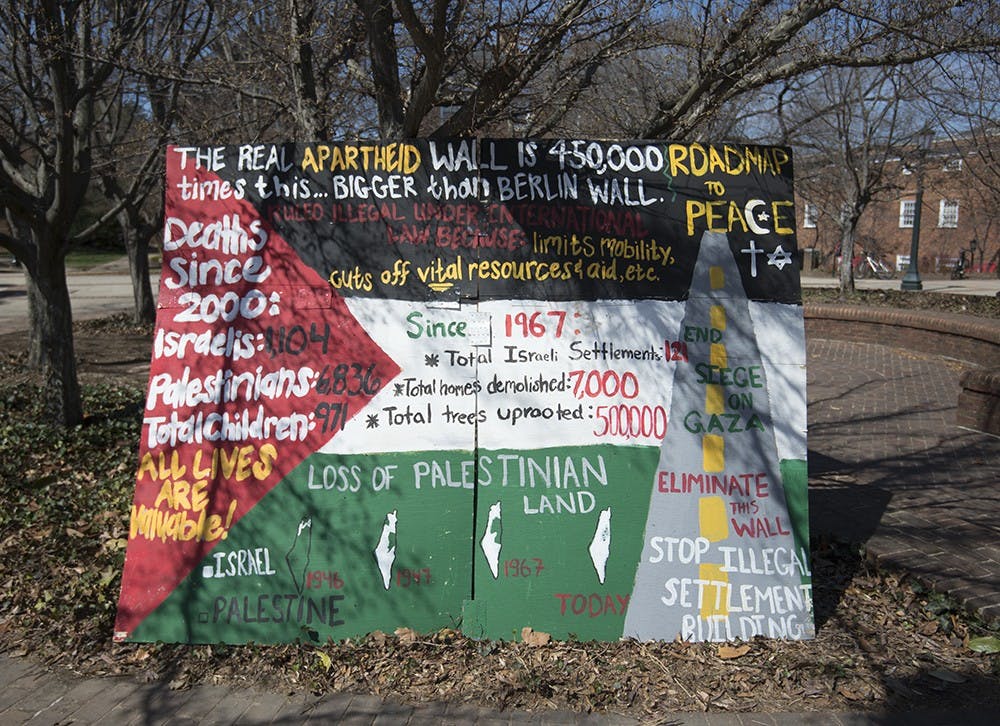Students for Peace and Justice in Palestine displayed an apartheid wall Monday outside of Newcomb to recognize Israeli Apartheid Week — an international event at the end of February and the beginning of March to raise awareness of the Israeli-Palestinian conflict. The wall symbolizes the West Bank barrier in Israel and displays statistics about Israeli occupation.
Vice President of SPJP Luma Abunimer, a second-year Engineering student, said while it may be controversial to compare the Israeli-Palestinian conflict to the history of apartheid in South Africa, she believes the event is important.
“These events [of Israeli Apartheid Week] are meant for people to sort of just understand and learn what is actually going on [in Israel] because a lot of the information isn’t available in mainstream media,” Abunimer said.
Ali Amirghassemi, a third-year College student and media outreach for SPJP, also said he hoped the event would further educate people.
“Our aim is to inform people because we feel it’s a topic that’s very misrepresented in the media and oversimplified,” Amirghassemi said. “The history is never given justice.”
Abunimer said though the response has been mostly positive, there has been some resistance to the terminology used.
“We’ve actually received a lot of support from other minority associations on Grounds and a lot of people so far, so we hope that continues,” Abunimer said.
J-Street President Bill Baker, a fourth-year College student, said he has concerns about the terminology used by SPJP.
“Calling Israel an apartheid state is not, in my mind, a fair assessment,” Baker said in an email.
First-year College student Jennifer Sachs, a Hoos for Israel board member, said the statistics written on the wall and the terminology used present the conflict out of context.
“Along with my fellow members of Hoos for Israel, I believe that accusing Israel of being an apartheid state represents a denial of the nuances of the situation and promotes an emotional, inaccurate portrayal of the Israeli-Palestinian conflict,” Sachs said in an email.
Amirghassemi said that while the terminology may be shocking, it is necessary to draw attention to the conflict.
“I concede it’s a very bold statement to make… but it catches people’s attention,” Amirghassemi said. “[People] see something that catches their eye like ‘apartheid’ and they’re kind of confused, but then that motivates them to learn more, and when you learn more you learn, really, how complex and nuanced the issue is.”
Baker, however, said this attention was more harmful than helpful, as it ostracizes other communities and disregards positive aspects of Israeli society.
“Certainly, freedom of speech is one of the hallmarks of American democracy and SPJP is allowed to protest the occupation by calling Israel an apartheid state,” Baker said. “But is it productive?”
While the wall highlights Israel’s role in the conflict, Abunimer said she hopes it will draw attention to America’s involvement as well.
“I think it’s important to stress that us as Americans, our tax dollars are going to funding Israel, their military [and] their policies that are oppressing and killing Palestinian people,” Abunimer said.
Baker said although Israeli Apartheid Week makes peaceful talks more difficult, he hopes to be able to have progressive conversations in the future.
“The Occupation must end, but it will only end when we can get around a single table, talk productively and work together for a better future,” Baker said.







